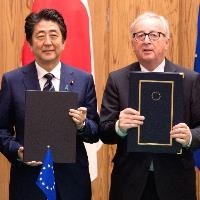(STRASBOURG) – February 1, 2019 is the date set for entry into force of the EU’s trade agreement with Japan, as the European Parliament gave its consent Wednesday to the largest bilateral trade deal ever negotiated by the EU.
The EU-Japan Economic Partnership Agreement, signed on 17 July 2018, creates a trade zone of 600 million people, and covers a third of global GDP and about 40 per cent of global trade.
The vote was welcomed by Commission president Jean-Claude Juncker, saying it “that reinforces Europe’s unequivocal message: together with close partners and friends like Japan we will continue to defend open, win-win and rules-based trade. And more than words or intentions, this agreement will deliver significant and tangible benefits for companies and citizens in Europe and Japan.”
The Economic Partnership Agreement between the EU and Japan will remove almost all custom duties adding up to 1 billion annually for EU companies. It represents a clear stance in support of rules-based, free and fair trade “at a time of serious protectionist challenges” .
While the most sensitive EU sectors such as rice production are safeguarded, wine, cheese, beef, pork, pasta, chocolate and biscuits will enter duty-free either immediately or after a transition period, 205 products with European geographical indications will be protected, to help small and medium sized enterprises (SMEs) which make up 78 percent of exporters to Japan.
Key parts of the Economic Partnership Agreement
The agreement will, in particular:
- eliminate duties on many cheeses such as Gouda and Cheddar (which currently are taxed at nearly 30%) as well as on wine exports (currently at 15% on average);
- allow the EU to substantially increase its beef exports, and open additional opportunities for export of pork products;
- ensure the protection in Japan of more than 200 Geographical Indications (GIs), high-quality European traditional food specialities, and the protection of a selection of Japanese GIs in the EU;
- remove tariffs on industrial products in sectors where the EU is very competitive, such as cosmetics, chemicals, textiles and clothing;
- commit Japan to international car standards, with the result that EU exports of cars to Japan is made significantly easier;
- open services markets, in particular for financial services, e-commerce, telecommunications and transport;
- guarantee EU companies access to the large procurement markets of 54 large Japanese cities; remove obstacles to procurement in the economically important railway sector.
Under the agreement, Japan opens up its rail procurement market and public procurement in its main cities to European competition. E-commerce, international maritime transport and postal services will also be liberalised.
Parliament welcomed the high level of environmental and labour protection, the commitment to the Paris Agreement to combat climate change, and encourages both parties to combat illegal logging. However stressed that Japan must ratify all relevant labour codes set by the International Labour Organisation.
Parliament has also approved the Strategic Partnership Agreement, which extends cooperation to areas such as energy, education, research and development, development, and the fight against climate change and terrorism.
Japan has already ratified the agreement. After the endorsement of the trade deal by the European Parliament, Council is set to give its final go-ahead on 21 December which allows the agreement to enter into force on 1 February 2019. For the strategic partnership agreement to enter into force, all member states have to ratify it.
Negotiations on a separate investment protection agreement with Japan are ongoing.
EU-Japan Economic Partnership Agreement - key elements


